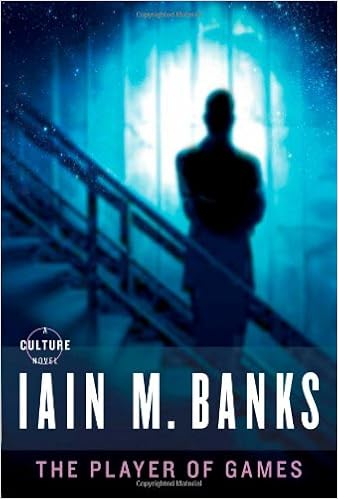Product Details
- Series: Culture (Book 2)
- Paperback: 416 pages
- Publisher: Orbit; Reprint edition (March 26, 2008)
- Language: English
- ISBN-10: 0316005401
- ISBN-13: 978-0316005401
- Product Dimensions: 5.5 x 1.3 x 8.2 inches
- Shipping Weight: 13.6 ounces (View shipping rates and policies)
- Average Customer Review: (247 customer reviews)
- Amazon Best Sellers Rank: #6,851 in Books (See Top 100 in Books)
Description
The Culture - a human/machine symbiotic society - has thrown up many great Game Players, and one of the greatest is Gurgeh. Jernau Morat Gurgeh. The Player of Games. Master of every board, computer and strategy. Bored with success, Gurgeh travels to the Empire of Azad, cruel and incredibly wealthy, to try their fabulous game...a game so complex, so like life itself, that the winner becomes emperor. Mocked, blackmailed, almost murdered, Gurgeh accepts the game, and with it the challenge of his life - and very possibly his death.
Best5Zach's Thoughts
I don't think it's any secret that I read Sci-Fi almost exclusively. In particular, works that center on action and technology are my favorite.
As I typically do, this book was one that I randomly picked up in B&N. I mean that in all honesty. I picked it at random, read the description, and looked up the reviews on Amazon. My wife has been telling me to move out of my comfort zone. Well, according to the description, this was a move away...even if ever so slight. So, based on the outstanding reviews, I took a chance.
Let me first say that the book WAS very entertaining. I read it very fast because I was drawn into it.
However, I was left with a feeling that this could have been a plot from a Star Trek episode. Gurgeh is the greatest over-all game player in the Culture. It is his life's work. The basic premise of the novel is that Gurgeh is being sent to participate in what is essentially a holy game for a newly discovered alien race that could pose a threat to the Culture. And, he is going to do so purely as an exhibition. Though he wouldn't have considered it otherwise, a plot twist forces his hand into going.
As I said, the book kept me fascinated enough to finish it in only a few days, but even from the onset of the plot, I had a serious issue. I will try not to spoil it, but would like to elaborate at the plot holes.
Gurgeh is the best gamer in the culture for a reason. He is calculative. He knows the risks. He runs all the scenarios. And, despite that, he wonders haplessly into a trap where is his first set up, then forced to take this mission. Why? As a gamer, he draws all of his excitement and accomplishment from playing the games and winning on his own, yet his downfall is completely contrary to his very character who knows all the possibilities and risks.
Furthermore, when he is set up, taking this mission to Azad isn't the only possible solution to the problem, yet, we are made to think it is. It was very obvious that there were a handful of ways that Gurgeh could have avoided this, considering how desperate he was to avoid going to play Azad.
Secondly, I have a large issue that an empire, whose very basis is built on this game, would ever consider letting an outsider play, even in a exhibitionist capacity. We are led to believe that there had been little to no contact between the two races and yet Gurgeh is allowed to participate in a holy game where the stakes are grand, from political positions to the seat of the emperor.
Ok, so we overlook that possibility. It becomes fairly clear that in order for the empire and the culture to let Gurgeh participate, something must be on the line, yet both sides pretend that there isn't. Gurgeh wonders himself. Although he is slightly off on his assumptions, he does think that one side...or both....are setting him up. As if he is a pawn in a much greater game.
The last 50 pages were about as abstract and random as could be with several major plot twists that made little to no sense. The ending itself was pretty predictable, that is, what was really going on and why Gurgeh was forced into the situation. But the particulars surrounding it seemed to make no sense.
I do appreciate the parallels that the author is trying to make about the class between different cultures. In particular, the liberal ideals and how a culture can benefit from removing all things taboo by accepting everything. In this case, the empire of Azad is portrayed to be a classically conservative race on the outside, while being corrupt on the inside by their true liberal ideals. And, that ends up being their undoing. While I appreciate the story-within-the-story, there were also some major logic gaps in that argument.
Anyway, a good book. Entertaining. But, some serious issues with plot drivers. Additionally, the points that the author is trying to make between conservative and liberal societies is interesting, but misguided.


No comments:
Post a Comment